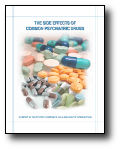There have been 10 drug regulatory agency warnings from six countries (United States, Canada, Australia, New Zealand, France, and Singapore) on Concerta. These are as follows:
New Zealand, June 01, 2010: New Zealand’s drug regulatory agency MedSafe reviewed recent changes to the European product information for Methylphenidate (Concerta) and recommended that the New Zealand data sheets be updated to include the same changes. The changes outline that patients being considered for Methylphenidate treatment should be carefully screened for cardiovascular risk, heart disease and psychiatric disorders, including any family risk factors. Also, because Methylphenidate (Concerta) can cause or worsen some psychiatric disorders (such as depression, suicidal thoughts, hostility, anxiety, agitation, psychosis and mania) patient’s “psychiatric well being” should be monitored. Source: “Methylphenidate – updated guidance when treating children,” New Zealand Medicines and Medical Devices Safety Agency, June 2010.
United States, June 15, 2009: The FDA reported on a study reviewing 564 healthy children taking stimulants who died suddenly. They notified the public that there might be an association between the use of stimulant medications (including Concerta) and sudden death in healthy children. Source: “Stimulant Medications Used in Children with Attention-Deficit/Hyperactivity Disorder – Communication about an Ongoing Safety Review,” Food and Drug Administration, June 15, 2009.
Australia, February 01, 2009: The Australian Therapeutic Goods Administration placed a boxed warning (the strongest warning) onto the ADHD psychostimulant drug Methylphenidate (Concerta and Ritalin) for drug dependence. It warns that chronic abuse of Methylphenidate can lead to a marked tolerance and psychological dependence with varying degrees of abnormal behavior and frank psychotic episodes can also occur. Source: “Boxed Warning, Contraindications and strengthened Precautions for Methylphenidate,” Janssen-Cilag, February 2009.
France, January 23, 2009: France’s government drug regulatory agency issued recommendations for the monitoring of patients prescribed Methylphenidate (Concerta), stating that patients should be monitored for cardiac problems, emerging psychiatric conditions, and the weight of the patient, during treatment. Source: L’agence europenne du mdicament (EMEA), “Point d’information” Agence francaise de securite sanitaire des produits de sante (AFSAPPS), January 23, 2009.
United States, February 21, 2007: The FDA directed ADHD drug manufacturers to distribute “patient friendly” guides to consumers warning about serious psychiatric and cardiovascular problems, including stroke, heart attack, sudden death and psychotic reactions caused by ADHD drugs, including Concerta. Source: “FDA Directs ADHD Drug Manufacturers to Notify Patients about Cardiovascular Adverse Events and Psychiatric Adverse Events,” FDA News, February 21, 2007.
Canada, September 21, 2006: Health Canada increased warnings on ADHD drugs, including Concerta, due to the “potential for psychiatric adverse events“ including agitation and hallucinations. This is in addition to earlier Canadian warnings of cardiovascular risks from ADHD Drugs including cardiac arrest, stroke and sudden death. Source: “New Information Regarding Uncommon Psychiatric Adverse Events for All ADHD Drugs” Information Update, September 21, 2006.
Canada, May 26, 2006: Health Canada issued new warnings of rare heart risks for all drugs prescribed for ADHD, including the risk of sudden death. The public advisory cautioned that the stimulants (including Concerta) can increase heart rate and blood pressure and that this can result in “cardiac arrests, strokes or sudden deaths.” This warning applies to both adults and children. Source: “New cautions regarding rare heart-related risks for all ADHD drugs,” Health Canada, 2006-35, May 26, 2006.
Singapore, April 19, 2006: The Singapore Health Sciences Authority said it was reviewing the cardiovascular effects of stimulants (which includes Concerta). They reported adverse reactions in children aged between 6 and 12, including disturbed sleep, giddiness, abdominal pain, gastric discomfort, palpitations, rash and itching. Source: “Pay attention to risk of stimulant drugs for kids; Reports of increased health risks have put the spotlight on drugs like Ritalin used to treat attention deficit hyperactivity disorder in children. Shefali Srinivas reports.” Straits Times, April 19, 2006.
Australia, March 28, 2006: The Australian Therapeutic Goods Administration released its database of 400 adverse reactions to stimulants (such as Concerta) in children taking them. Children as young as five suffered strokes, heart attacks, hallucinations and convulsions. Source: “Dark side of a wonder drug,” The Australian, March 28, 2006.
United States, February 09, 2006: The FDA’s Drug Safety and Risk Management Advisory Committee urged that the strongest “black box” warning be issued for ADHD stimulants, including Ritalin, Adderall and Concerta because of the risk of heart attacks, strokes and sudden deaths. Dr. Steven Nissen, a cardiologist and member of the advisory committee called this a “potential public health crisis.” The FDA said it had received reports of about 25 deaths linked to the drugs and a larger number of cases involving serious consequences, such as heart attacks. Source: “Warning Urged for ADHD Drugs” LATimes.com, February 10, 2006.
This brochure is a simple guide that documents the dangerous and deadly side effects of the drugs prescribed to millions of men, women and children diagnosed with bogus mental disorders.
Please note: No one should attempt to get off of psychiatric drugs without doctor’s supervision. To help find medical practitioners in your area, click here


 Download The Side Effects of Common
Download The Side Effects of Common
SHARE YOUR STORY/COMMENT